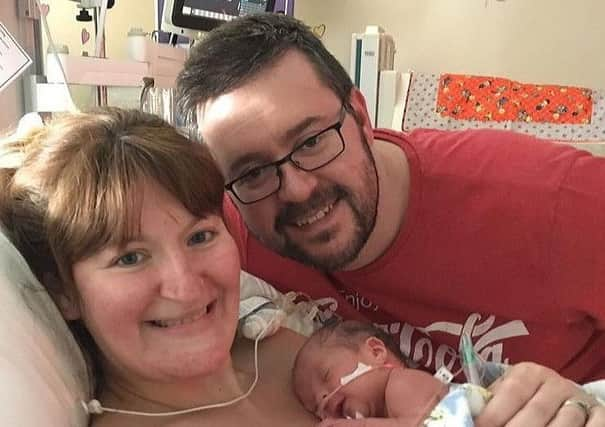Anna Todd: A mother knows – trust your instincts and listen out for your unborn baby


Every year we celebrate Scott’s birthday. Five years on and it’s still emotional for us all. We take a wreath in the shape of a boat to his grave and we release balloons. We celebrate who he might have become and what he might be doing now.
But in many ways, Scott does live on and not just in our hearts. Losing Scott helped save another life – his little sister Alice, who is now three. I like to think he’s saving other lives too as I work with various organisations to help spread the word about the importance of mums-to-be paying attention to their baby’s movements in the womb.
Advertisement
Hide AdAdvertisement
Hide AdMy first child, Rosie, was born in 2011. After a textbook pregnancy I found myself whisked into theatre at Wishaw General, my baby in distress. Rosie was eventually born as healthy as can be. I, however, needed physio, treatment for an abscess and counselling for post-natal depression – all within a year and a half after giving birth.
By 2014, the trauma of Rosie’s birth behind me, we were ready to extend our family. Again there were no issues during the pregnancy itself, but complications arose during birth, caused by what’s known as an incompetent cervix. The condition affects one in 100 pregnancies and means that the body can’t hold the baby any more. Scott was delivered stillborn.
The loss is indescribable. So much hope and expectancy, which grew alongside our baby growing in the womb, were all taken in the blink of an eye. The sense of profound loss was horrendous.
The care from staff at Wishaw General Hospital after we lost Scott was extraordinary. The bereavement care available to me and my husband Stuart allowed us both to find a way to move on. Everything in the care I received was tailored to me. I was treated like a person and nothing was too much to help us come to terms with our loss.
The counselling did its work and a year later we were both amazed that we wanted to try again. I became pregnant at the start of 2016.
After what happened to Scott, the pregnancy was naturally an anxious one. During my baby shower at 34 weeks, I was suddenly aware the baby had stopped moving. With the loss of Scott, I was acutely tuned in to how my body felt and knew something wasn’t right. Over the next 48 hours, movements were sporadic and I was in and out of hospital as the baby was monitored. It was my acute awareness of how my baby was feeling that saved her life.
The hospital staff listened to me and they were receptive to my needs and concerns. After it was discovered that the baby’s blood pressure was dangerously low, an emergency Caesarean brought baby Alice into the world. At 4lb 14 ounces, Alice needed a lot of help after birth, but now she’s as healthy, amazing and troublesome as any three-year-old!
While the number of stillbirths has reduced in recent years, in Scotland four babies a week are stillborn. I’m delighted the Scottish Government’s Stillbirth Group has launched a new campaign to raise awareness of the three key ways expectant mums can potentially lower their risk of this happening to them. Being aware of foetal movements is one of those ways, along with sleeping on your side and stopping smoking.
Advertisement
Hide AdAdvertisement
Hide AdI’m so happy that the importance of being tuned to baby’s movements in the womb is getting the national importance that it deserves through this campaign and the work of the Scottish Patient Safety Programme’s Maternity Care Programme.
Since Alice was born I’ve found myself working at times with SANDS Charity (Stillbirth and Neonatal Death Society) as a befriender to help others through the trauma of stillbirth. I’ve spoken at the Royal College of Physicians to help develop a bereavement pathway, and I’ve spoken at midwifery conferences.
It all helps with the permanent sense of loss to know that others might learn and benefit, that losing Scott may be helping to save others. If I had one piece of advice, it would be for mothers to trust their instincts and their sense of their own body. Your baby talks to you through movement, so be prepared to listen. You could save your baby’s life. For information on work to prevent stillbirth in Scotland, visit the SPSP Maternity Care Programme at ihub.scot/improvement-programmes/scottish-patient-safety-programme-spsp/maternity-and-children-quality-improvement-collaborative-mcqic/maternity-care/ For advice on preventing stillbirth see www.parentclub.scot/stillbirth
Anna Todd is a mother of three and a befriender with the SANDS Trust.